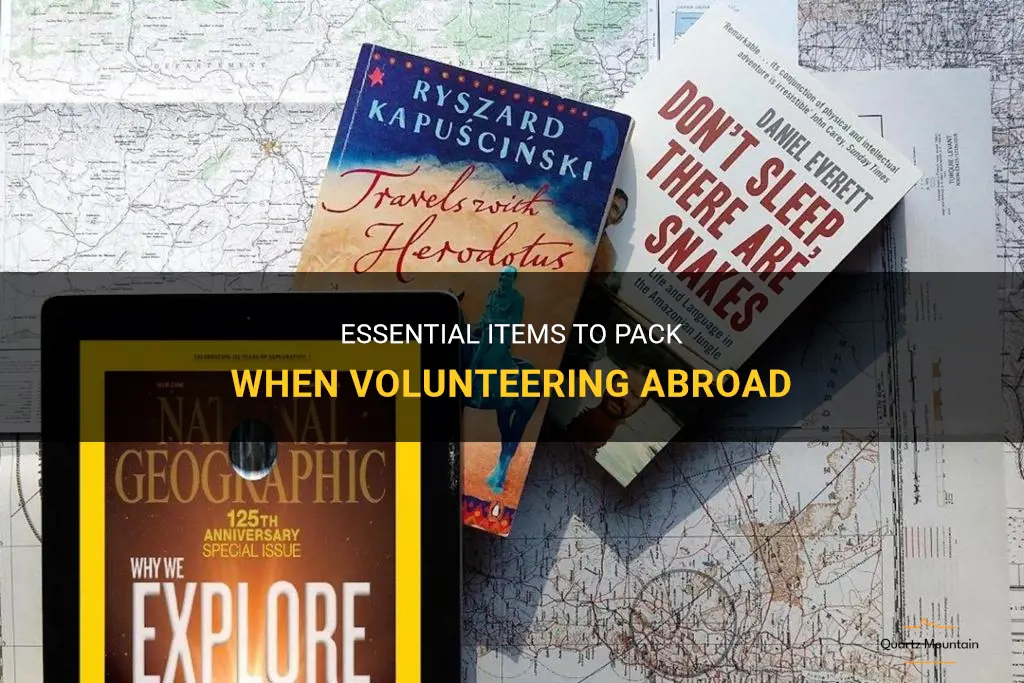
Volunteering abroad is an amazing experience that allows individuals to make a meaningful impact in communities around the world. Whether you are teaching English, building houses, or providing medical support, it is essential to be prepared and pack the right items for your journey. In this article, we will explore the essential items that every volunteer should pack when embarking on their adventure abroad. From practical necessities to personal comforts, these items will ensure that you are equipped to make a difference and have a fulfilling experience while volunteering abroad.
What You'll Learn
- What essential items should I pack for a volunteer abroad program?
- Are there any specific clothing items I should bring when volunteering abroad in a particular climate or region?
- Do I need to bring my own toiletries when volunteering abroad, or will they be provided?
- Are there any electronics or gadgets that would be useful to bring when volunteering abroad?
- Are there any specific documents or paperwork I need to bring with me when volunteering abroad?

What essential items should I pack for a volunteer abroad program?
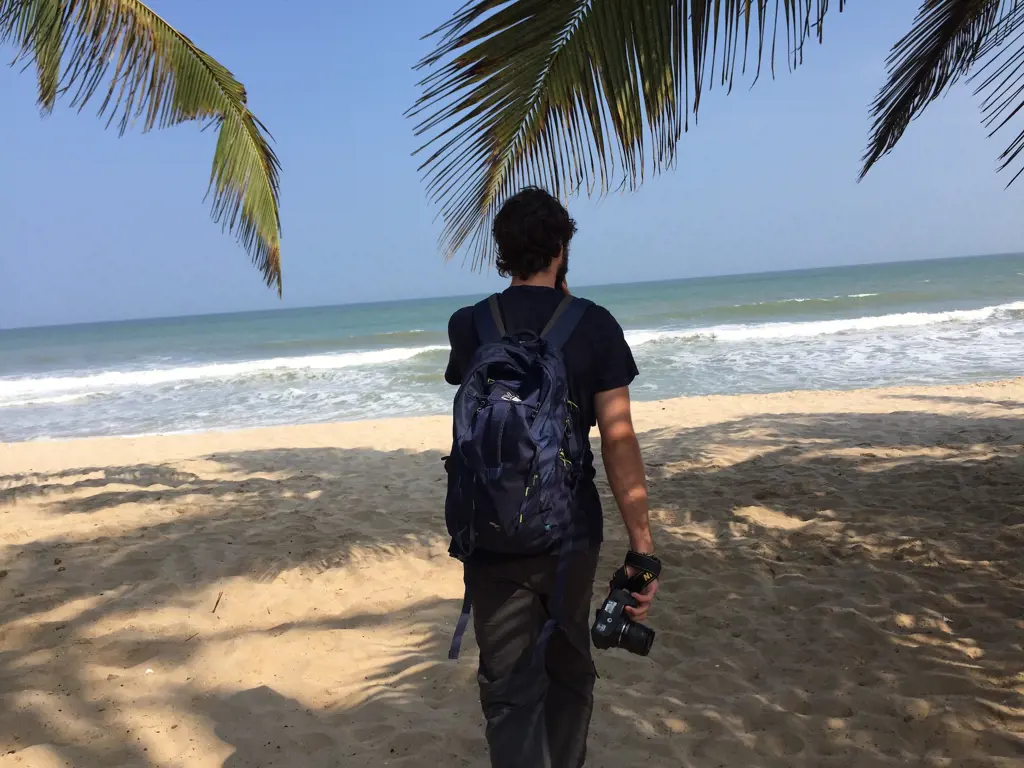
When preparing for a volunteer abroad program, it is important to ensure that you pack the essential items that will help make your experience more comfortable and efficient. Whether you are teaching English, working on a construction site, or assisting with healthcare, there are certain items that can be beneficial to have with you. Here are some essentials to consider packing for your volunteer abroad program:
- Clothing: Pack clothes that are appropriate for the climate and culture of your destination. This can include lightweight and breathable fabrics for hot weather or warmer clothing for colder climates. Make sure to also pack comfortable walking shoes, as you may be on your feet for long periods of time.
- Toiletries: Bring a small toiletry kit that includes items such as a toothbrush, toothpaste, soap, shampoo, and any other personal care items you may need.
- Medications: If you take any prescription medications, be sure to bring enough for the duration of your program. It is also a good idea to carry a small first-aid kit with basic over-the-counter medications such as pain relievers and band-aids.
- Electronics: Depending on the nature of your program, you may need to bring electronics such as a laptop, smartphone, or camera. These can be useful for documenting your experience and staying connected with loved ones back home. Be sure to also bring the necessary chargers and adapters for your destination.
- Travel documents: Don't forget to bring your passport, visa, and any other necessary travel documents. It is also a good idea to make copies of these documents and keep them in a separate location in case of loss or theft.
- Money: It is important to have access to money while volunteering abroad. Make sure to bring a combination of cash and cards, and be familiar with the local currency and exchange rates.
- Language guidebook: If you are travelling to a country where you don't speak the language, consider bringing a pocket-sized language guidebook or downloading a language app on your smartphone. This can help you communicate with locals and navigate your way through your new surroundings.
- Snacks: Depending on your destination, it may be a good idea to pack some snacks from home. These can come in handy during long travel days or when you are in an area with limited food options.
- Comfort items: Consider bringing a few items from home that bring you comfort and remind you of home. This could be a family photo, a favorite book, or a small pillow. These small comforts can make your volunteer experience feel more like home.
- Open mind and positive attitude: While not a physical item, having an open mind and a positive attitude is essential for a successful volunteer abroad program. Be prepared to embrace new experiences, learn from different cultures, and adapt to different ways of doing things.
In conclusion, when packing for a volunteer abroad program, it is important to consider the specific needs of your destination and program. By packing the essential items mentioned above, you will be better prepared to make the most of your experience and have a positive impact on the community you are volunteering in.
The Ultimate Packing Guide for a Trip to Myrtle Beach
You may want to see also

Are there any specific clothing items I should bring when volunteering abroad in a particular climate or region?
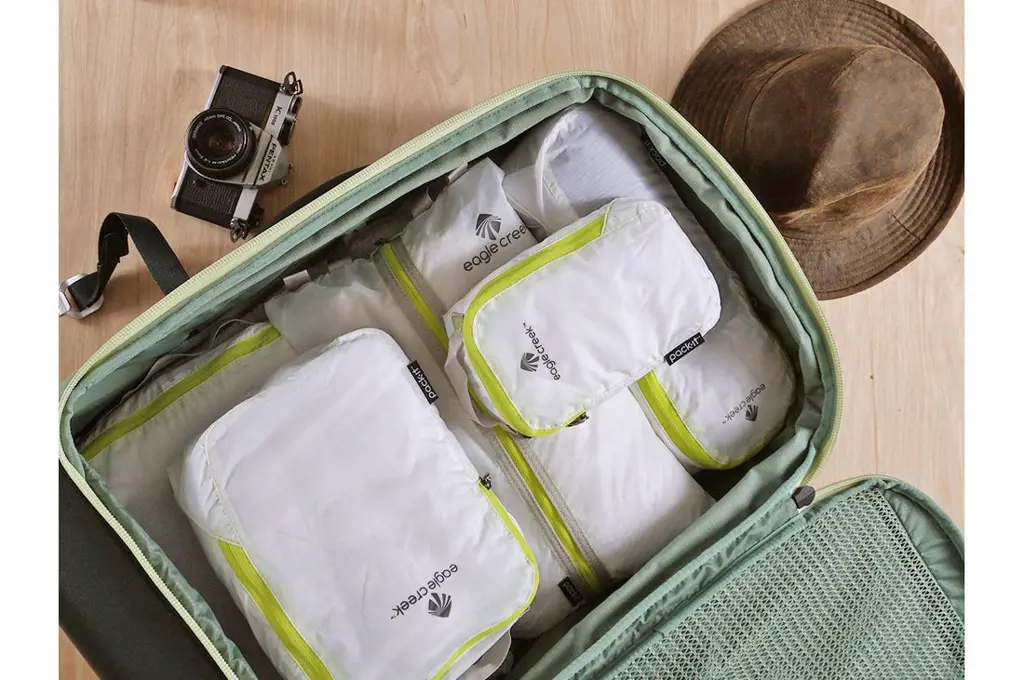
When volunteering abroad, it is important to pack clothing items that are suitable for the climate and region you will be working in. This will ensure that you are comfortable and have the necessary protection from the elements. Here are some specific clothing items you should consider bringing depending on the climate and region:
Hot and Humid Climate:
If you are going to volunteer in a hot and humid climate, lightweight and breathable clothing is key. Opt for light-colored, loose-fitting shirts made from natural fibers such as cotton or linen. These fabrics allow air to circulate and help to keep you cool. Avoid synthetic materials as they can trap heat and moisture.
Shorts and skirts are also a good choice for hot climates. Make sure they are made of lightweight materials and are of an appropriate length, taking cultural norms into consideration. Wearing a hat or a cap with a wide brim will protect your face and neck from the sun.
Cold Climate:
If you are volunteering in a cold climate, it is important to pack warm and insulating clothing. Layering is key to staying warm in cold weather. Start with a base layer made of moisture-wicking material such as merino wool or synthetic fabric. This will keep you dry by pulling sweat away from your skin.
On top of the base layer, add a middle layer of a warm and insulating material such as fleece or down. This layer will provide insulation and trap body heat. Finally, the outer layer should be a waterproof and windproof jacket or coat to protect you from the elements.
Don't forget to pack warm accessories such as hats, scarves, and gloves. These items will help to keep your extremities warm, as they tend to lose heat quickly.
Tropical Climate:
Tropical climates are characterized by high temperatures and high humidity. Lightweight and breathable clothing made from natural fibers such as cotton or linen is ideal for these conditions. Loose-fitting tops, shorts, and skirts will help to keep you cool and allow air to circulate.
It is also important to protect yourself from the sun when working in a tropical climate. Pack a hat or a cap with a wide brim to shield your face and neck from the sun's rays. Don't forget to bring a good pair of sunglasses and apply sunscreen regularly.
Mountainous Region:
If you are volunteering in a mountainous region, the weather can be unpredictable and temperatures can drop rapidly. Dressing in layers is essential to adapt to changing conditions. Pack a base layer that is moisture-wicking and insulating, such as merino wool or synthetic fabric.
On top of the base layer, add a mid-layer of a warm material such as fleece or down. This layer will provide extra insulation. Finally, the outer layer should be a waterproof and windproof jacket or coat to protect you from rain, snow, and wind.
Bring warm accessories such as hats, gloves, and scarves to protect your extremities from the cold. It is also important to have sturdy and waterproof footwear to navigate uneven terrain.
When volunteering abroad, it is crucial to research and understand the climate and region you will be working in. This will help you pack the appropriate clothing items to ensure your comfort and safety. Remember to consider cultural norms and dress appropriately to show respect for the local customs.
Essential Items to Pack for Your Next Fitness Retreat
You may want to see also

Do I need to bring my own toiletries when volunteering abroad, or will they be provided?
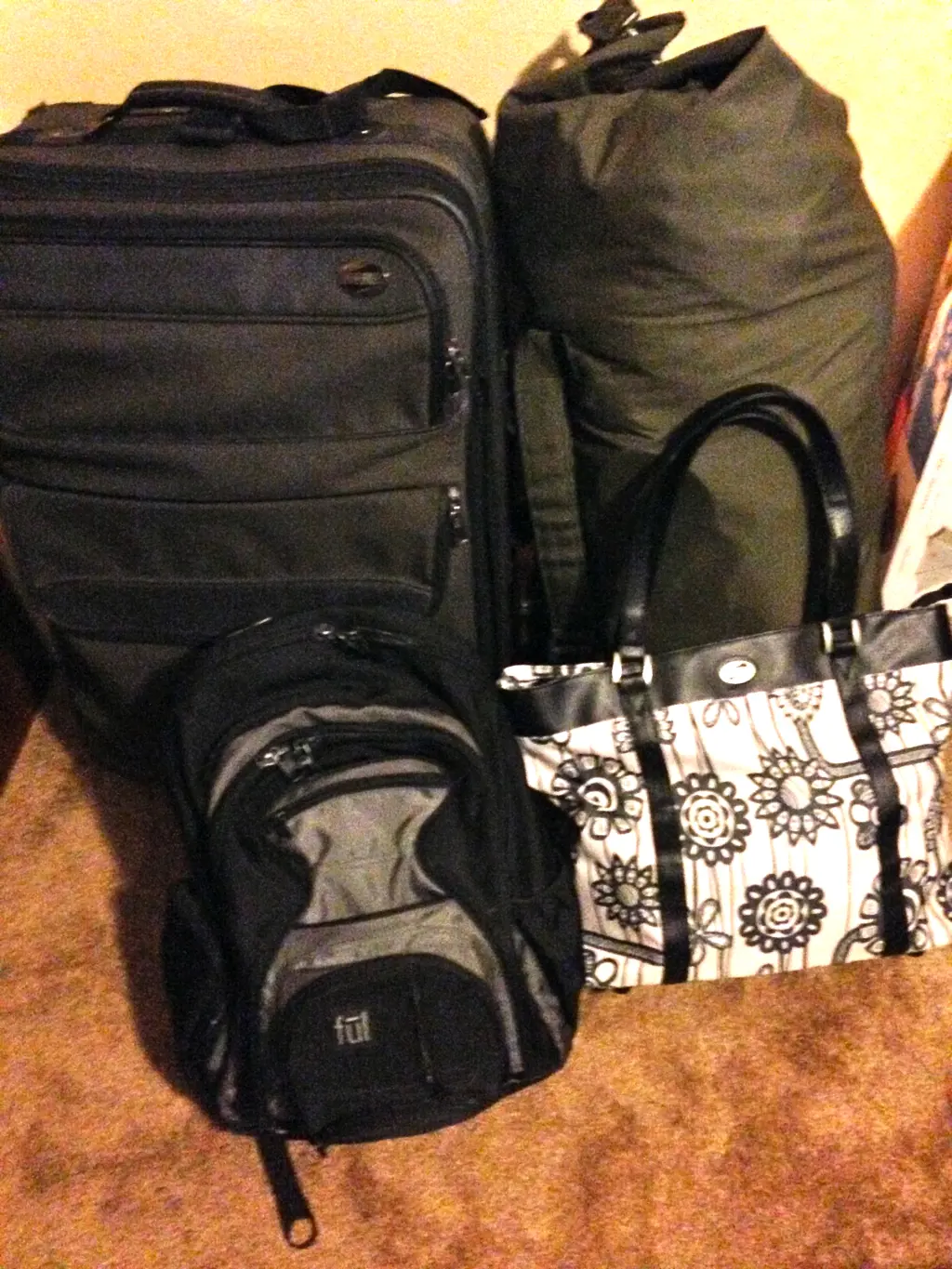
When preparing for a volunteer abroad experience, one of the common questions that may arise is whether you need to bring your own toiletries or if they will be provided for you. The answer to this question can vary depending on the organization you are volunteering with and the specific program you will be participating in. In this article, we will explore the different factors that can influence whether or not you need to bring your own toiletries when volunteering abroad.
Organizational policies:
Each volunteer organization may have its own policies regarding the provision of toiletries. Some organizations may provide basic toiletries such as soap, shampoo, and toothpaste for their volunteers, while others may not. It is important to thoroughly read the volunteer program guidelines and check with the organization to understand their policies regarding toiletries.
Duration of your stay:
The duration of your stay can also impact whether you will need to bring your own toiletries. If you are volunteering for a shorter period, such as a couple of weeks, the chances are higher that the organization will provide you with the necessary toiletries. However, for longer-term volunteer placements, it is more common for volunteers to be responsible for bringing their own toiletries.
Remote locations:
If your volunteer placement is in a remote or rural area with limited access to amenities, it is more likely that you will need to bring your own toiletries. In such locations, access to basic necessities like toiletries may be scarce, and it is advisable to come prepared with your own supplies.
Personal preferences and specific needs:
Even if the organization provides basic toiletries, you may still want to bring your own for personal preference or specific needs. For example, you may prefer a specific brand of toothpaste or shampoo, or you may have allergies or sensitivities that require you to use certain products. In such cases, it is recommended to bring your own toiletries to ensure your comfort and well-being during your volunteer experience.
Sharing resources:
In some volunteer settings, there may be communal bathrooms or limited resources available. In such cases, it is advisable to bring your own toiletries to ensure you have access to the items you need when you need them. Sharing personal items like toothpaste or soap may not be hygienic or practical in such situations.
In conclusion, whether you need to bring your own toiletries when volunteering abroad will depend on various factors, including the policies of the organization you are volunteering with, the duration of your stay, the location of your placement, and your personal preferences and needs. It is important to carefully research and communicate with the organization beforehand to understand their policies and to come prepared with your own toiletries if necessary. Remember, it is always better to be over-prepared than to be caught without essential items during your volunteering experience.
Essentials to Include in a Spontaneous Overnight Bag
You may want to see also

Are there any electronics or gadgets that would be useful to bring when volunteering abroad?
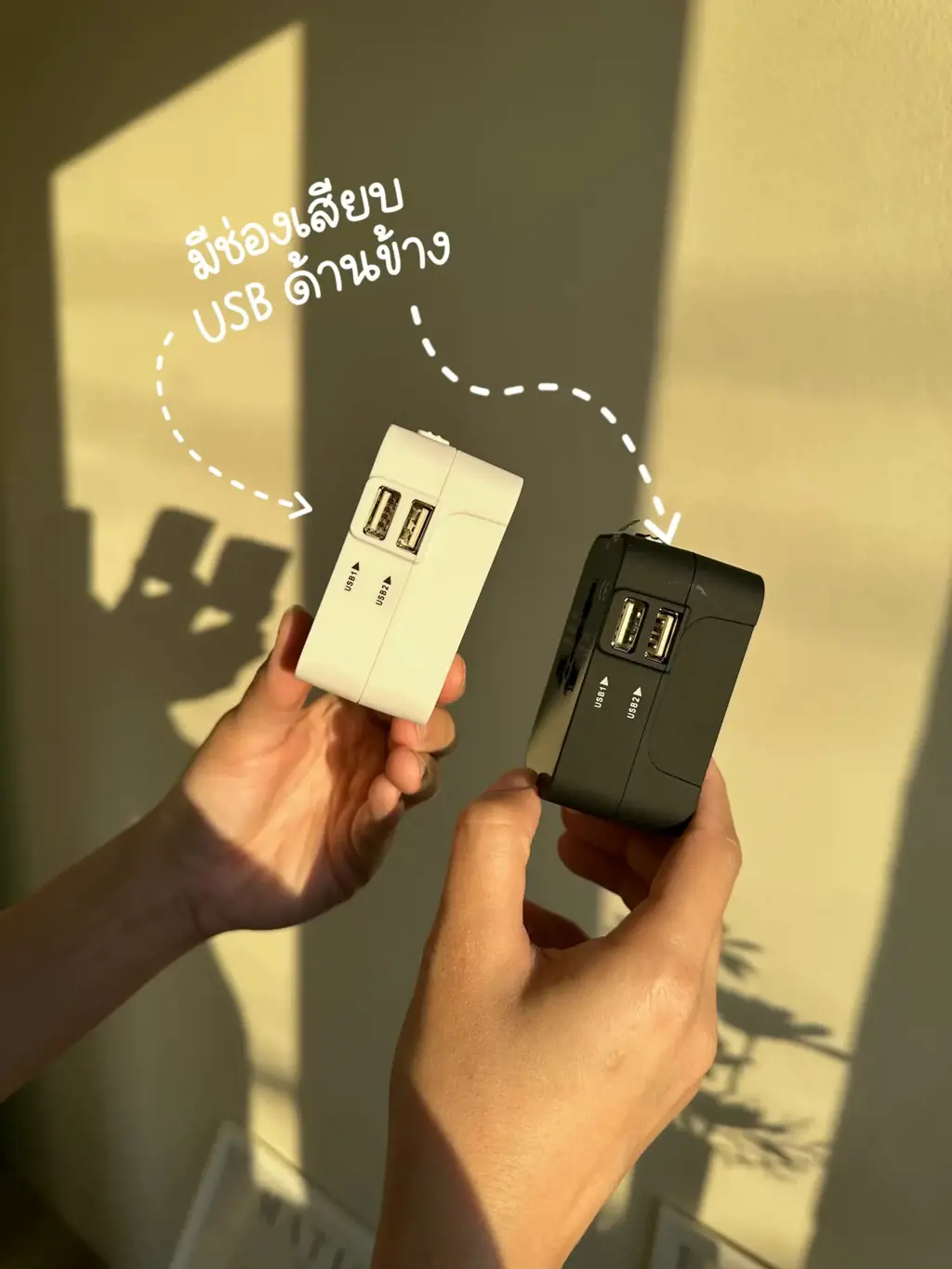
When volunteering abroad, it is important to be prepared for the challenges and tasks that lie ahead. While many essentials, such as clothing and toiletries, may be obvious to bring, it may also be beneficial to bring along some electronics or gadgets to enhance your volunteering experience. Here are some electronics and gadgets that can be useful when volunteering abroad:
Smartphone:
A smartphone is an essential gadget to have when volunteering abroad. It not only allows you to stay connected with family and friends back home but also provides a multitude of useful features. You can use apps for translation, currency conversion, maps, and navigation, which can be incredibly helpful when navigating unfamiliar surroundings. Additionally, a smartphone can serve as a camera to document your experiences.
Power bank:
Access to electricity may not always be readily available when volunteering abroad. Whether you are working in remote areas or experiencing power outages, having a power bank can be a lifesaver. It allows you to recharge your smartphone, camera, or any other electronic device on the go, ensuring that you never run out of power.
Portable Wi-Fi hotspot:
In some locations, access to the internet may be limited or unreliable. A portable Wi-Fi hotspot can provide a stable internet connection, allowing you to stay connected and communicate with others. It can also be beneficial for researching local information, sharing updates on social media, or even working remotely if necessary.
Portable speakers:
If your volunteering involves working with a group or conducting workshops, portable speakers can be a great tool to have. They can amplify your voice and ensure that everyone can hear you clearly. They can also be used for entertainment purposes during downtime, such as playing music or watching movies with your fellow volunteers.
E-reader:
If you are an avid reader, bringing an e-reader can save you from carrying multiple books. E-readers are lightweight and can hold thousands of books, allowing you to have a vast library at your fingertips. This can be particularly beneficial during long flights or downtime when you want to relax and escape into a good book.
Multi-purpose tool:
A multi-purpose tool, such as a Swiss Army Knife, can be handy in various situations. It can have features like a knife, screwdriver, bottle opener, and more, making it a versatile tool to have when volunteering abroad. It can be useful for basic repairs, opening packages, or even cooking.
While these electronics and gadgets can be useful, it is always important to consider the limitations and cultural appropriateness of using them during your volunteering experience. It is essential to respect local customs and guidelines and use these devices responsibly.
In conclusion, bringing along certain electronics and gadgets can enhance your volunteering experience abroad. A smartphone, power bank, portable Wi-Fi hotspot, portable speakers, e-reader, and a multi-purpose tool are some examples of useful gadgets. However, it is crucial to use these devices responsibly and be mindful of cultural norms and guidelines. Packing these gadgets can help you stay connected, navigate unfamiliar territory, and make your volunteering experience more efficient and enjoyable.
Essential Items to Pack on Your Snowboarding Trip
You may want to see also

Are there any specific documents or paperwork I need to bring with me when volunteering abroad?

When volunteering abroad, there are typically several documents and paperwork that you will need to bring with you. These documents are often required by the organization you will be volunteering with, as well as by the country you will be traveling to. Here are some of the specific documents and paperwork that may be required:
- Passport: Your passport is the most important document you will need when traveling abroad. Make sure that it is valid for at least six months beyond your planned stay. It's also a good idea to make copies of your passport and keep them in a separate location in case your passport is lost or stolen.
- Visa: Some countries require a visa for entry, even for volunteering purposes. Check with the embassy or consulate of the country you will be traveling to in order to determine if you need a visa and what type of visa you will need (e.g., tourist visa, volunteer visa). The application process for a visa can take several weeks, so make sure to start the process well in advance of your departure date.
- Medical records and vaccinations: Depending on the country you will be traveling to, you may be required to provide proof of certain vaccinations or immunizations. It is also a good idea to bring a copy of your medical records with you, especially if you have any pre-existing conditions or allergies.
- Travel insurance: It is highly recommended to purchase travel insurance before volunteering abroad. This insurance can provide coverage for medical emergencies, trip cancellations, lost or stolen belongings, and more. Make sure to carefully read and understand the terms and coverage of the insurance policy before purchasing.
- Volunteer program documentation: The organization you will be volunteering with may have specific paperwork that they require you to complete. This could include an application form, a background check, a liability waiver, and more. Make sure to carefully review and complete all necessary paperwork before your departure.
- Emergency contact information: It's important to have a list of emergency contact information, including the contact details of a trusted friend or family member back home, as well as the contact details of the organization you will be volunteering with. Keep this information in a secure place, such as your carry-on bag or wallet.
- Money and identification: It's important to have a sufficient amount of money and identification with you when traveling abroad. This can include cash in the local currency, credit cards, and a form of identification such as a driver's license or a national ID card. Make sure to keep these items secure and easily accessible.
It's also a good idea to make copies of all your important documents and keep them in a separate location, such as in your checked luggage or with a trusted friend or family member back home. This can help to expedite the process of replacing lost or stolen documents if necessary.
In conclusion, when volunteering abroad, it is important to be prepared with the necessary documents and paperwork. Make sure to check the specific requirements of the country and organization you will be volunteering with, and take the time to gather and organize all the required documentation well in advance of your departure date. By doing so, you can ensure a smooth and hassle-free volunteering experience.
The Ultimate Guide to Packing for a Trip Around the World
You may want to see also
Frequently asked questions
When packing clothing for volunteering abroad, it's important to consider the climate and local customs of your destination. In most cases, it's best to pack lightweight and breathable clothing that covers your shoulders and knees to respect local modesty norms. It's also important to pack comfortable and practical shoes that are suitable for the types of tasks you'll be performing.
It's always a good idea to pack a basic first aid kit when volunteering abroad. This should include items such as band-aids, antiseptic cream, painkillers, and any necessary prescription medications. However, it's important to research the availability of medical supplies in your destination and consult with a healthcare professional before packing anything specific.
Aside from basic toiletries such as soap, toothpaste, and a brush/comb, it can be helpful to pack a few comfort items from home. This could include items like a favorite book, a small photograph album, or a journal to document your experiences. These personal items can provide a sense of familiarity and comfort in a new environment.
In addition to clothing, medical supplies, and personal items, it's important to pack any necessary travel documents such as your passport, visa, and any vaccination records required for entry. It can also be helpful to bring a universal adapter for your electronics, as well as a small padlock for securing your belongings. Finally, don't forget to pack a reusable water bottle to stay hydrated and reduce waste while volunteering abroad.







